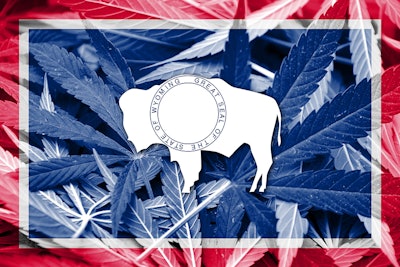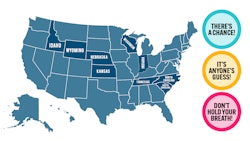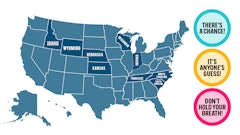
The U.S. Court of Appeals for the 10th Circuit affirmed on Oct. 27 that the 2018 Farm Bill does not preempt Wyoming state law enacted last year that regulates hemp THC products, including a ban on delta-8 THC and synthetic cannabinoids.
The plaintiffs in the case, including Casper-based Green Room LLC and 10 other hemp product retailers, manufacturers and wholesalers, also argued in the federal lawsuit that Wyoming’s statute violated the dormant Commerce Clause doctrine, amounted to an unconstitutional “regulatory taking,” and was “unconstitutionally vague and overbroad.”
The U.S. District Court for the District of Wyoming dismissed their complaint in August, denying them injunctive and declaratory relief. The 10th Circuit affirmed the district court’s dismissal on Monday, dealing a victory to Wyoming state officials, including Attorney General Bridget Hill and Department of Agriculture Director Doug Miyamoto.
The lawsuit stems from Wyoming lawmakers passing legislation in 2024 to criminalize the sale of hemp products with “psychoactive” substances. The legislation, Senate Enrolled Act 24 (SEA 24), amended Wyoming’s 2019 hemp laws to:
- Change the definition of hemp to exclude synthetic substances;
- Expand the definition of hemp to include all THC in the 0.3% calculation (not just delta-9 THC, as written in the 2018 Farm Bill); and
- Add naturally occurring and synthetic delta-8 THC to Schedule I of the Wyoming Controlled Substances Act.
“Thus, it became unlawful in Wyoming to ‘manufacture, deliver, or possess with intent to manufacture or deliver’ hemp or hemp products containing more than 0.3% THC (including delta-8 and delta-9) or synthetic substances – even though these products may be legal under federal law,” 10th Circuit Judge Harris L. Hartz wrote in this week’s opinion.
In affirming that Wyoming lawmakers acted within their authority, the 10th Circuit joins the 4th and 8th circuits in ruling that the 2018 Farm Bill – which federally legalized commercial hemp cultivation – does not preempt a state’s ability to regulate hemp more stringently than federal law.
The 4th Circuit ruled in January that Virginia’s law defining hemp by total THC and placing a 2-milligram-per-package limit on hemp products did not violate federal law. That circuit also covers Maryland, North Carolina, South Carolina, and West Virginia.
And the 8th Circuit ruled in June that Arkansas’ law prohibiting intoxicating hemp-derived cannabinoids by classifying delta-8, delta-9 and delta-10 THC, among other compounds, as Schedule IV substances did not violate federal law. That circuit also includes Iowa, Minnesota, Missouri, Nebraska, North Dakota and South Dakota.
In the 10th Circuit – which also includes Colorado, Kansas, New Mexico and Utah – the plaintiffs argued that Wyoming’s law should be preempted by the 2018 Farm Bill because it “imposes an impermissibly narrower definition of hemp” that “conflicts with the federal standard.”
While the 2018 Farm Bill affords states the right to regulate the production of hemp, the plaintiffs argued that it does not grant states the right to redefine hemp, claiming that state officials violated their constitutional rights.
The 10th Circuit ruled that the plaintiffs lack a substantial federal right to support their preemption claim.
“Plaintiffs argue that their preemption claim is derived from two substantive rights: one constitutional right and one statutory right. We are not persuaded,” Hartz wrote. “No language in the [2018 Farm Bill] speaks in terms of individual rights. ‘It does not say, for example, that licensed hemp [producers] may’ produce hemp as federally defined or that ‘no person shall prevent licensed hemp [producers] from’ producing hemp as federally defined. If anything, hemp producers are the ‘person[s] regulated,’ not the ‘individuals protected,’ by the statute. As the district court explained, ‘the mere fact federal law defines hemp does not mean it confers a right to hemp under that definition.’”
The plaintiffs also argued that SEA 24 violated the dormant Commerce Clause, a federal doctrine meant to prevent states from passing laws that restrict interstate commerce.
The 10th Circuit ruled that Wyoming’s hemp law doesn’t discriminate against interstate commerce since it does not distinguish between hemp produced in-state and out-of-state. Also, according to the court, the plaintiffs did not claim that they transport hemp products from one state to another through Wyoming.
Under the 2018 Farm Bill, states cannot interfere with the interstate commerce of hemp by preventing the continuous transportation of federally compliant materials through their borders. However, the 10th Circuit did not attempt to interpret whether Wyoming law collides with this farm bill provision.
“We should not interpret the Wyoming statute to prohibit such transportation before the state courts have had an opportunity to interpret state law to avoid such a potential conflict with federal law,” Hartz wrote.
Plaintiffs also argued that “SEA 24 is an unconstitutional regulatory taking” of their property without just compensation.
The Green Room announced on social media last month that it will be permanently closing its hemp store at the end of 2025 because “the law changes have put us into a position where we can no longer stay in business.”
In the lawsuit, the plaintiffs argued that they reasonably relied on the federal definition of hemp, along with similar language in the 2019 Wyoming hemp law, when they developed their businesses.
The court did not see it that way.
“SEA 24’s new restrictions on the production and sale of certain hemp products, they say, impermissibly ‘interfere[] with their investment-backed expectations,’” Hartz wrote. “They assert that ‘moving the goal posts in the middle of the game’ by ‘[c]hanging the definition of hemp’ constitutes a ‘regulatory taking.’ We cannot agree.”
The court ruled that the plaintiffs should have been “well aware” that Wyoming state lawmakers could change their views on hemp and hemp products.
“The state need not provide just compensation every time it adjusts its regulatory scheme, even if those changes incidentally impair or even destroy the businesses of some,” he wrote.
Finally, the plaintiffs argued that SEA 24 is “unconstitutionally vague and overbroad,” asserting that the definition of a “synthetic substance” is unclear and that the term “psychoactive” is not defined in the legislation.
CBD, a nonintoxicating hemp compound, could be interpreted as a psychoactive substance under SEA 24, resulting in the demise of Wyoming’s entire hemp industry, according to the plaintiffs.
The 10th Circuit ruled that a “reasonable reader” of the Wyoming statute would conclude that CBD does not constitute a psychoactive substance and that the defendants have “affirmatively agreed CBD is not banned” under the law.
“At most, plaintiffs raise nothing more than a routine question of statutory interpretation (that is, what does psychoactive mean in SEA 24?),” Hartz wrote. “If a statute could be struck down just because it is amenable to different interpretations, very few would pass constitutional muster.”



























